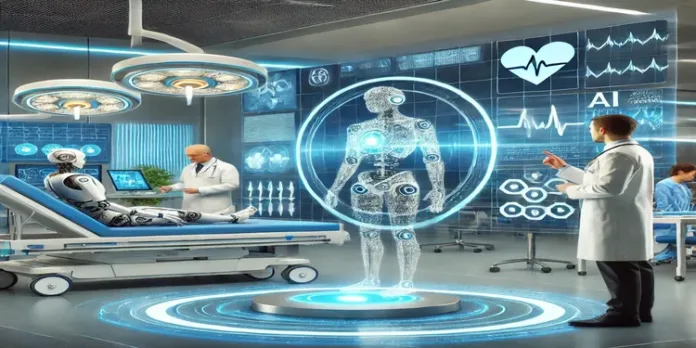The healthcare industry is undergoing a technological revolution, driven by artificial intelligence (AI) and machine learning (ML). From early disease detection to personalized treatment plans, AI is reshaping the way medical professionals diagnose and treat patients. With the ability to analyze vast amounts of medical data in real-time, machine learning is enhancing accuracy, reducing human errors, and improving patient outcomes.
As AI-driven solutions become more sophisticated, hospitals, clinics, and research institutions are rapidly adopting these technologies. But how exactly is machine learning transforming medical diagnoses, and what does the future hold for AI in healthcare? Let’s explore.
The Role of Machine Learning in Medical Diagnoses
Machine learning, a subset of AI, allows computers to learn from medical data, recognize patterns, and make predictions without explicit programming. This ability is revolutionizing healthcare in multiple ways:
1. Early Disease Detection and Prediction
One of the most promising applications of AI in healthcare is early disease detection. Machine learning algorithms can analyze medical images, genetic data, and patient history to detect diseases in their early stages.
- Cancer Detection: AI-powered imaging tools can identify cancerous cells in mammograms, CT scans, and MRIs with higher accuracy than traditional methods.
- Diabetes Prediction: ML models analyze blood sugar levels, lifestyle habits, and genetic factors to predict diabetes risk before symptoms appear.
- Cardiovascular Diseases: AI can assess ECG data and other vital signs to predict heart disease and stroke risks in advance.
2. Medical Imaging and Radiology
Radiologists are leveraging AI-powered tools to interpret X-rays, CT scans, and MRIs more efficiently. These AI-driven systems:
- Reduce diagnostic errors by detecting abnormalities that may be overlooked by human eyes.
- Speed up image analysis, allowing doctors to diagnose conditions faster.
- Improve accuracy, leading to earlier and more effective treatments.
3. AI-Assisted Pathology and Lab Testing
Machine learning models are enhancing the accuracy of pathology tests by analyzing blood samples, biopsies, and microbiology slides. AI-driven pathology can:
- Identify cancerous tissues with greater precision.
- Automate repetitive tasks, allowing pathologists to focus on complex cases.
- Reduce diagnostic turnaround time, leading to faster treatment decisions.
4. Personalized Treatment Plans
AI is enabling precision medicine, where treatments are customized for individual patients based on their genetic profile, medical history, and lifestyle.
- Genomic AI: Machine learning analyzes a patient’s DNA to recommend targeted therapies for cancer and genetic disorders.
- Drug Optimization: AI helps determine optimal medication dosages, reducing side effects and improving patient outcomes.
- Chronic Disease Management: AI-powered apps track a patient’s condition and suggest personalized lifestyle changes and medication adjustments.
5. Virtual Health Assistants and AI Chatbots
AI-driven virtual assistants are transforming patient-doctor interactions by providing:
- 24/7 symptom analysis, guiding patients on when to seek medical attention.
- Medication reminders, improving treatment adherence.
- Mental health support, offering AI-driven therapy and emotional assistance.
These AI tools reduce the burden on healthcare professionals, allowing them to focus on critical cases while still providing support to patients.
Advantages of AI in Medical Diagnoses
✅ Improved Accuracy
AI can analyze millions of medical records in seconds, identifying patterns and anomalies that might be missed by human doctors.
✅ Faster Diagnoses
AI-powered tools speed up diagnostic processes, ensuring that diseases are detected early and treatments start sooner.
✅ Reduced Healthcare Costs
Automating diagnostic processes reduces the need for unnecessary tests, lowering overall healthcare expenses.
✅ Better Patient Outcomes
Early and accurate diagnoses lead to effective treatments, reducing complications and improving recovery rates.
✅ Increased Accessibility
AI-driven diagnostic tools can bridge the healthcare gap in remote and underserved areas by providing virtual consultations and AI-assisted diagnostics.
Challenges and Ethical Concerns in AI-Driven Healthcare
Despite its potential, AI in medical diagnoses comes with challenges:
1. Data Privacy and Security
Medical data is highly sensitive. Protecting patient privacy and ensuring compliance with healthcare regulations is crucial. AI developers must implement robust encryption and cybersecurity measures.
2. AI Bias and Fairness
AI models are only as good as the data they are trained on. Biased or incomplete datasets can lead to inaccurate diagnoses for certain demographics. To address this, diverse and high-quality datasets must be used for training AI systems.
3. Lack of Human Oversight
AI should complement, not replace, human doctors. Final medical decisions must always involve healthcare professionals to ensure accuracy and accountability.
4. High Implementation Costs
While AI can reduce long-term healthcare costs, the initial investment in AI technology, infrastructure, and training is high. Widespread adoption may take time.
5. Regulatory and Legal Hurdles
Government regulations around AI-powered diagnostics are still evolving. Establishing clear guidelines for AI in medicine is necessary to ensure patient safety.
The Future of AI in Healthcare
The future of AI-powered medical diagnoses looks promising. Upcoming innovations include:
1. AI-Powered Wearable Health Devices
Smartwatches and fitness trackers equipped with AI-driven health monitoring will provide real-time alerts for heart rate irregularities, blood sugar levels, and other vital signs.
2. AI in Drug Discovery
Machine learning is accelerating drug discovery and development, cutting research timelines from years to months. AI helps scientists identify potential drug candidates faster and predict their effectiveness.
3. AI-Driven Robotic Surgery
AI-assisted robotic systems will perform minimally invasive surgeries with higher precision, reducing recovery times for patients.
4. AI-Enabled Telemedicine
Telehealth services powered by AI will expand remote diagnostics, making healthcare more accessible to patients worldwide.
5. Real-Time AI Diagnosis at the Bedside
In the near future, AI-powered point-of-care devices will provide instant diagnoses for critical conditions, eliminating delays in emergency treatments.
Final Thoughts
Artificial intelligence is revolutionizing medical diagnoses, making healthcare faster, more accurate, and more personalized. From early disease detection to AI-assisted surgeries, machine learning is enhancing medical decision-making and improving patient care.
While challenges remain, continued research, innovation, and ethical considerations will pave the way for AI-driven healthcare solutions that benefit everyone.
As AI technology continues to evolve, one thing is certain—the future of healthcare is intelligent, data-driven, and powered by AI.
